FAMU's record donation debacle: Five red flags Board of Trustees will likely review
In one week, Florida A&M University went from riding the highs of proclaiming to the world that it had secured the largest donation in HBCU history to scrubbing all mentions of the $237 million gift from social media and its website.
FAMU — an academic and athletic standout among the nation's historically Black colleges and universities — must now explain itself.
Each day, Rattlers, FAMU Foundation board members, trustees and onlookers learn more about Gregory Gerami, a young, little known hemp farmer from Texas who mysteriously surfaced and dazzled university officials with what they considered to be an epic act of generosity.

They were in awe, tears even, over the donation's potential impact. Yet, days after the surprise announcement at the May 4 graduation ceremony, damaging online posts quickly deflated FAMU's bubble.
The university fired off a statement doubling down on its unflinching stance that it had properly vetted Gerami, the validity of the private stock gift and his business ventures as CEO of Batterson Farms Corp.
Beyond that, FAMU officials largely remained quiet and away from the public eye until an emergency meeting by the FAMU Foundation Board Thursday offered stunning insights on FAMU's failure to act on potential red flags and proper procedure for accepting gifts of this magnitude.
It marked the first time FAMU President Larry Robinson had publicly addressed the issue, along with one of his key confidantes and leadership team member, Shawnta Friday-Stroud, who simultaneously serves as vice president for university advancement, executive director of the FAMU Foundation and dean of the university's School of Business and Industry.
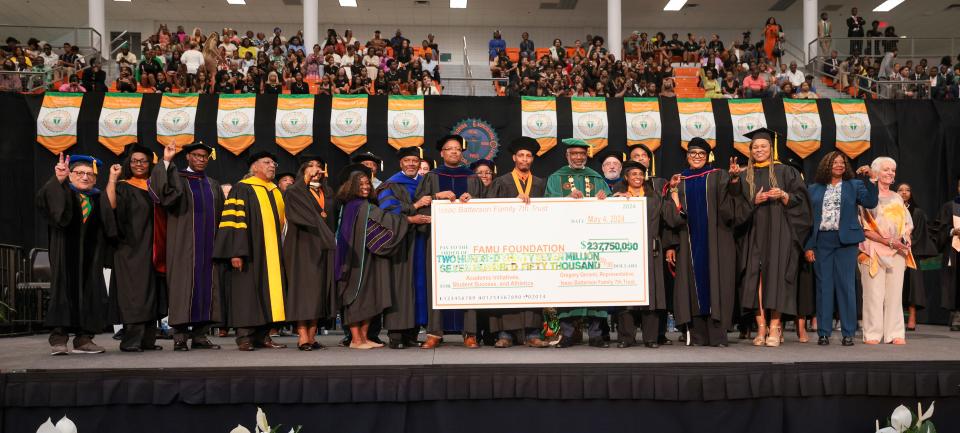
Foundation board members were baffled at how, despite six months of calls, virtual meetings and interactions with Gerami, the university's top leaders felt comfortable and confident all was in order.
During the meeting, Robinson announced the university was putting a "pause" on any further activity tied to the historic donation through the Isaac Batterson Family 7th Trust, in which Gerami is a trustee.
On Wednesday, Robinson and other university leaders are expected to face a second round of direct questioning as FAMU's Board of Trustees holds a special meeting solely to discuss what has become a source of embarrassment for the top publicly ranked HBCU.
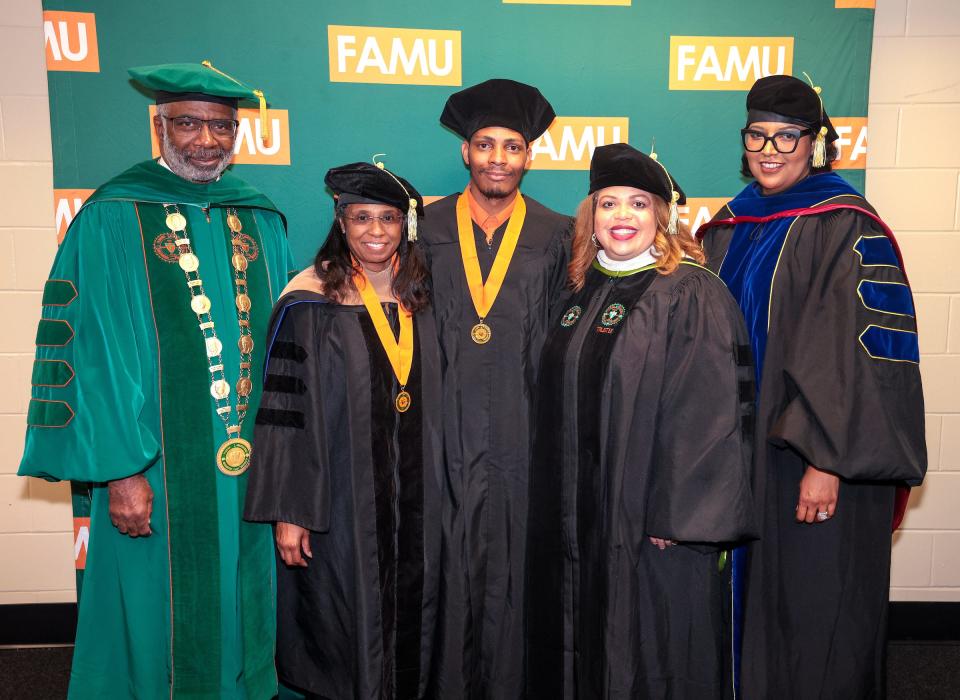
FAMU President Larry Robinson again under scrutiny
This will be the second time in two years that Robinson will be on the hot seat.
He faced high scrutiny from the Board of Trustees and Board of Governors following the FAMU football team's near boycott of a pivotal game and complaints about their needs as student athletes being neglected.
Kristin Harper, FAMU's Board of Trustees chairwoman, was present for the surprise announcement during the graduation ceremony, signed off on the Gift Agreement released to the Democrat by FAMU that shows she was a witness and appeared in a university-produced video with Robinson, Gerami and others seated at a table celebrating the momentous event.
"We will get to the bottom of this," Harper said in a statement. "I ask for patience and grace as we work diligently to gather information, take action, and build a stronger Florida A&M University."
Ahead of the meeting, the Tallahassee Democrat analyzed five factors that led to the crisis of confidence in a donation that would have doubled the university's endowment:
Board members, trustees didn't know about the mega-million gift ahead of time
FAMU unleashed a social media blitz after the announcement. The coordinated communication sparked a viral stream of orange and green posts on all major platforms.
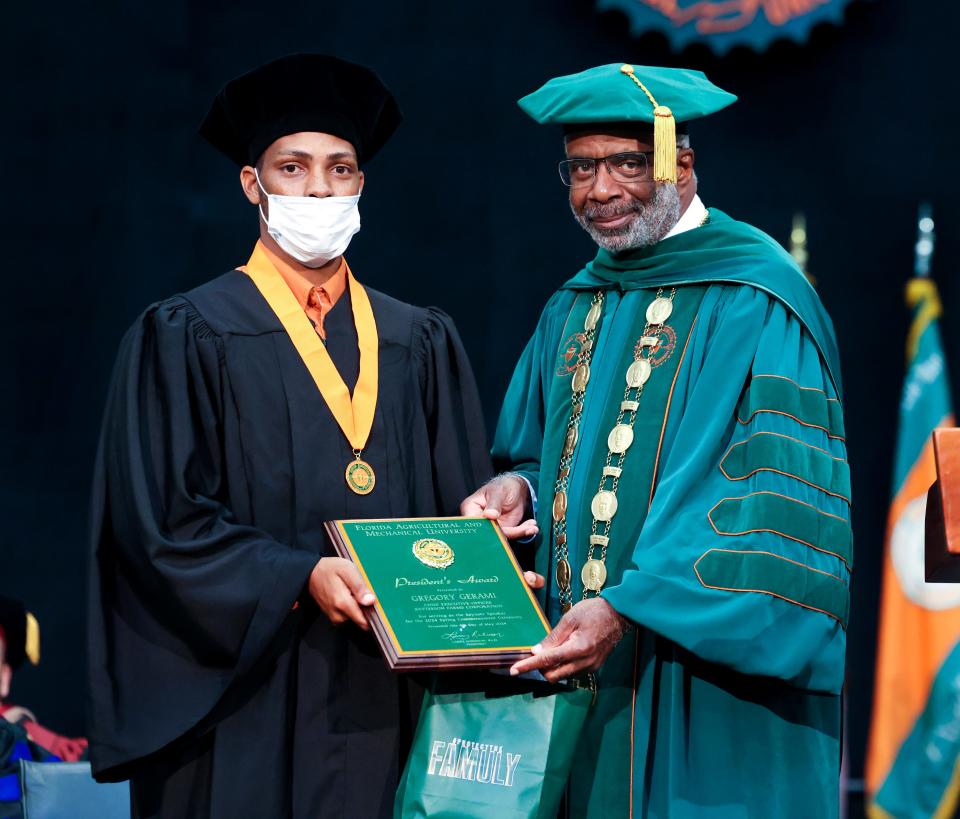
According to foundation board members, however, they learned about the big news the same day as everyone else. It wasn't until the next day when they received an official notice from the university about the donation.
That didn't sit well with several board members. Friday-Stroud responded by saying the university was bound by a non-disclosure agreement and couldn't speak about the donation details outside of a select few.
At least one member of the board of trustees blasted the lack of communication from the university.
“I keep hearing about this NDA that the university is hiding behind, but there are a lot of questions that need to be answered,” Trustee Deveron Gibbons told the Democrat as questions swirled about the donation and its donor.
“As vice chair of the Board of Trustees, I have a responsibility to safeguard the integrity of the university I cherish, but I have deep concerns that this process is moving too quickly to embrace a gift without proper scrutiny,” he said in a statement.
Now, all of the social media celebrations are gone. Any mention of Gerami and what was supposed to be a crowning achievement for the university have been deleted from FAMU's Facebook, X, LinkedIn and Instagram accounts.
Top FAMU officials intentionally withheld donation details
In order to receive the gift, Gerami imposed an NDA and the university accepted the terms of the gag order on discussing the donation.
To the dismay of some board members, FAMU administration capped the number of people intimately involved in details about the gift to about half a dozen, including Robinson, Friday-Stroud, Director of Development Audrey Simmons-Smith, Athletics Director Tiffani-Dawn Sykes, The Center for Disability Access and Resources (CeDAR) Director Deborah Sullivan and Director of Communications Keith Miles.
Those excluded from the details leading up to the announcement included the FAMU Foundation Board Chairwoman Lisa LaBoo, CEO, Prosperity Investment Services, Inc., and Harper, CEO of Driven to Succeed, LLC.
"That is how we operate with all donors, not just this donor but all donors," Friday-Stroud said. "But in addition to that, this donor did request for an NDA. While we don't do a lot of NDAs, some organizations make us sign NDAs to enter into agreements with them."
Friday-Stroud outlined the initial points of contact Gerami had throughout the process, which included Robinson early on. Preliminary screenings took place. Discussions advanced.
She said the president, along with herself and Simmons-Smith, talked to Gerami and his financial advisors to discuss areas at the school he was interested in supporting. He was most interested in providing funding for FAMU Athletics, its Center for Disability Access & Resources (CeDAR), along with other departments.
During talks, Friday-Stroud said Gerami indicated he wanted to make the donation announcement and be the keynote speaker at the spring graduation, where thousands filled the Lawson Center on campus. He was told that wouldn't be possible without first having the donation in hand.
"So then, I think somewhere in there, Spelman (College, an all-female HBCU in Atlanta,) announced their $100 million gift, and at that point Mr. Gerami said that he'd wanted to do something more than that."
Spelman College announced in January 2024 that it is the recipient of a $100 million gift from businesswoman and Spelman trustee Ronda Stryker and her husband, William Johnston.
After that, the trust transferred the stock to FAMU and the graduation celebration was scheduled with Gerami as the keynote speaker who would also be awarded the President's Award. During the celebration, university officials brought out a large check and the crowd erupted in applause as Gerami exclaimed "and the money is in the bank."
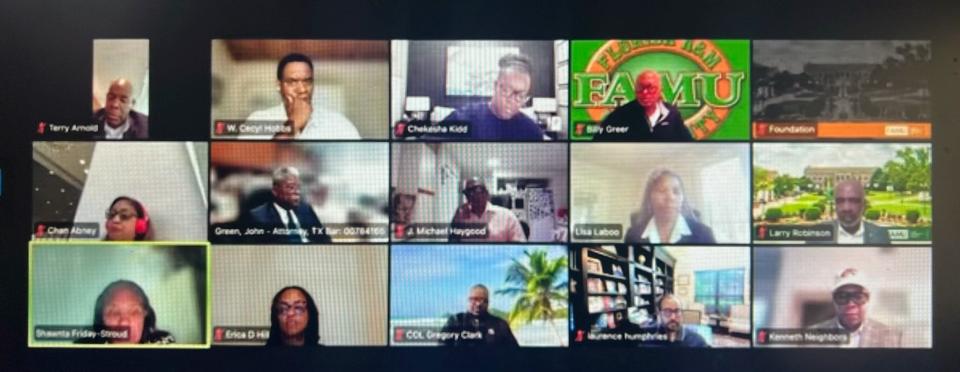
But it wasn't. Instead, there was "14 million shares of stock of intrinsic value" with a schedule to convert it to cash over a 10 year period.
Without a proper valuation, the stock could be worth “$500 million or it could be zero,” foundation board member Laurence A. Humphries said at the meeting.
“Yes, there is clearly risk, and we are seeing that in everything that has shaken out,” Friday-Stroud responded. “But at the time that was the decision,” she said of plans to move forward.
FAMU admits proceeding with donation despite 'Google searches'
Gerami, 30, doesn't have much of a digital footprint. And what does exist on social media doesn't appear to reflect that of a rising entrepreneur in the hemp industry as one of the few Black hemp farmers in Texas.
Gerami appears to have deleted social media posts, including ones riddled with grammatical errors, following the FAMU fallout. Gerami's Facebook page, as of May 10, only had posts of pictures of him on campus and a thank you photo from FAMU for his "historic donation to Florida A&M University."
In an exclusive interview with the Tallahassee Democrat — in which he was accompanied by Carmen Cummings Martin, vice president of Alumni Affairs and University Advancement, and Communications Associate Director Andrew Skerritt — Gerami said he was adopted at the age of 1.
He said his interest in FAMU's Center for Disability and Resources (CeDAR) was fueled by the fact that he suffered from a host of physical ailments as a child, including brain damage, cerebral palsy, seizures and asthma. He said he was adopted by a single mother, who took in other children with disabilities.
"Our mom was a saint ... and did everything on her own," he said, in a conference room at Lee Hall on FAMU's campus.
He painted the image of someone who beat the odds and wanted to help FAMU, which he called a "hidden gem," to reach its potential through research underway.
Court records indicate a darker side in his personal life. They reveal Gerami, who told the Democrat he's now twice divorced, was arrested on charges of family violence Jan. 18, 2022, in Tarrant County, Texas.
A judge granted Gerami’s second wife’s request for a divorce in 2021 when he didn’t show up for court.
The court found he had a history of domestic violence, and the judge issued a permanent injunction against Gerami from having any contact with their two children unless approved by his ex-wife.

Gerami himself brought up the issue in a conversation with Democrat adding "there are two sides to every story."
“I don’t condone any violence," he said. "I didn’t go wash myself off the internet. I didn’t go denying anything that is on the internet. I didn’t go trying to hide anything on the internet. But I’m not going to speak to that.”
Friday-Stroud said an initial screening of Gerami's wealth was completed, followed by "a more expansive screening of research" on his background. Subsequent searches yielded "different information" but she didn't go into details.
Robinson was then brought up to speed and presented with the findings, according to Friday-Stroud. She said the information was "pretty much, all of which, of what's been put out now on social media."
"We said, 'OK, we would proceed with the decision to move forward,'" said Friday-Stroud, adding it was around this time when the family's trust stock certificates were transferred into the university's account through Carta, a somewhat controversial company used as a private equity management platform.
While Gerami has participated in several subsequent interviews with the Democrat, he initially declined to offer basic information about his business, including its main address, and said if someone wants his company's address, "they need to go look and find it online."

He later provided the address in the same interview. Documents through the Texas Department of Agriculture confirm his business address as 5900 Balcones Drive in Austin, Texas. His company website only has a grid map and a line about his corporate office being in Sierra Blanca, Texas.
Gerami also pushed back when asked what city he lives in, stating no one needs to know that.
"People think they know what city I live in, but they're not going to be able to find what city I live in," he said. "I know that for a fact."
His Texas-approved hemp license indicates he lived in San Antonio, Texas, as of Jan. 31, 2024.
When asked Monday about how he feels about being involved in a controversy that could damage FAMU's reputation and ability to raise money in the future by not being forthcoming, he said, "Of course I care about FAMU and (for) the rest of the questions I'm going to refer you back to FAMU to ask whatever questions FAMU wants to answer for you."

In addition, he didn't share a reaction to FAMU's decision putting a pause on the donation activity: "I don't really have much to say on that because, to be honest, ... I've heard different stories," said Gerami, adding he didn't watch the full FAMU Foundation meeting. "I'm really not fully educated to have a conversation on that."
As for FAMU's Board of Trustees meeting, Gerami said the trustees should be meeting to discuss the donation.
"That's pretty normal in this circumstance, the way things have gone. The way the media has portrayed certain things, I think that's pretty normal (and) not an unusual situation," Gerami said. "With the size of the gift, I don't think that's unusual."
No one contacted Coastal Carolina University, another school Gerami attempted a later-flopped multi-million donation
Word of FAMU's historic donation and aftermath spread like wildfire online. Yet, this wasn't the first time Gerami saw his name in the news about a shaky record donation.
Extensive coverage in the Sun News in Myrtle Beach, South Carolina, detailed inconsistencies in Gerami's wealth and illustrated a tangled web of how Coastal Carolina University and the hemp farmer parted ways.
"Gerami, as an anonymous donor, had pledged $464 million to the South Carolina college in 2020, according to records The Sun News acquired, though the university only publicly announced a $95 million gift,: a May 10 article said. "But that relationship was terminated less than four months later with CCU officials citing an unfulfilled early obligation."
Since last year, The Sun reported several articles on Gerami and CCU's now defunct arrangement that can be found with a Google search of Gerami's name. In addition, Gerami first contacted FAMU about making a donation roughly six months ago.
During the foundation's emergency meeting, Friday-Stroud was asked if anyone from FAMU had contacted CCU or any other schools for their account or insights on Gerami as part of the university's due diligence.
"No, we did not reach out to the others," Friday-Stroud said alluding to the university wanting to stay in accordance with state law on donor privacy.
Stock valuation vetting raising questions
FAMU and the Isaac Batterson Family 7th Trust, with Gerami as the foundation representative, signed the gift agreement that outlines how the donation will be distributed.
It said, “The donor donated 14 million shares of stock of intrinsic value worth at least $239,000,000 and will donate an additional $61,000,000 over 10 years.”
Gerami came to FAMU with an appraisal that put Batterson Farms Corp. stock at $15.85 per share, said Friday-Stroud, adding FAMU's auditors reviewed the valuation of stock during the financial statement review.
"With any stock, you take a risk, whether it's going to be valued at zero ... or valued higher," Friday-Stroud said. "But, looking at it and the particular industry that it's in ... That's kind of what led to saying, 'OK.'"
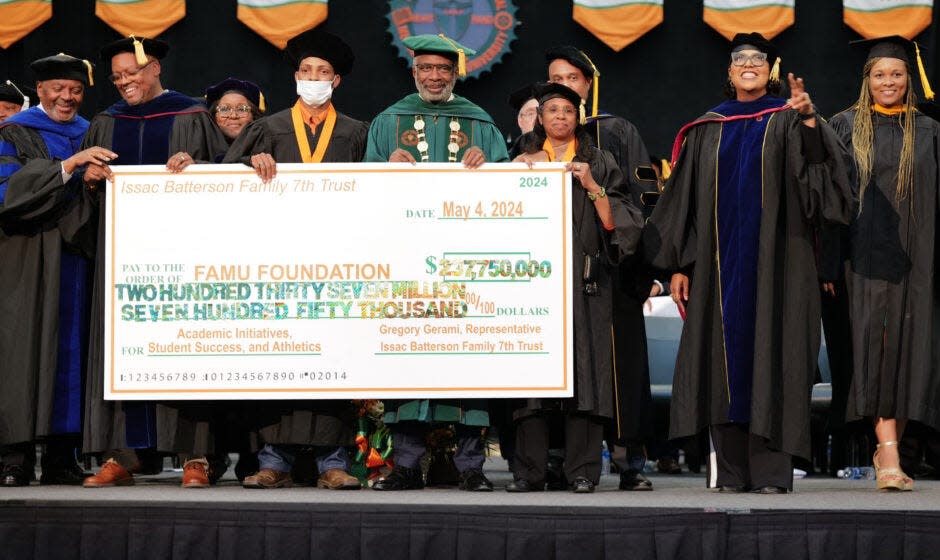
In addition, Friday-Stroud said Batterson Farms Corp. is required to submit audited financial statements to FAMU's auditors for the donation gift to be justified at the $15.85 a share. If statements are not received, the stock valuation would be recorded as $5.12 per share.
One day before the meeting, Disciplina Capital Management President and Chief Investment Officer Matthew Wright said the firm served the foundation as investment advisors and clarified its role as it relates to the donation.
Foundation board members wanted to know if the firm provided third party valuation of the stocks present, which some said is typically done for privately held securities. In this case, Disciplina said that was outside of its scope of work and that's not what the company was asked to do by FAMU's administration.
"Disciplina confirms receipt and review of the donor statement, which was gifted by Gregory Gerami, CEO of Batterson Farms, to the Florida Agricultural and Mechanical University Foundation at graduation on Saturday, May 4, 2024," Wright wrote. "Since the donated assets are private, illiquid investments, our review does NOT verify or guarantee the accuracy or the reliability of the valuation/pricing as noted in the statement."
In an attempt to gain clarity, board members peppered Wright with questions. Foundation board member Chekesha Kidd, founder and CEO of Kinumi, Inc., said questions about stock valuation should not be directed to Disciplina.
She said: "That's what you hire a banker for. ... We need to ask those questions of the University Advancement team."
By the end of the meeting, foundation board members said the university needed to do certain steps in the immediate and near future:
Develop a crisis communication plan to reset the narrative around the gift.
Obtain an independent third party valuation of the privately held stock and mitigate risks to asset value pending the outcome of valuation.
Review foundation policies and procedures around major gifts and board involvement.
"My concern is our reputation has been greatly impacted," said Terry Arnold, a foundation board director and senior vice president and chief human resources officer at Southern Glazer’s Wine and Spirits.
"I want to make sure that we restore faith in our alumni and all the friends and family that support Florida A&M University."
Contact Economic Development Reporter TaMaryn Waters at [email protected] and follow @TaMarynWaters on X.
This article originally appeared on Tallahassee Democrat: FAMU donation debacle: Five red flags Board of Trustees will review
